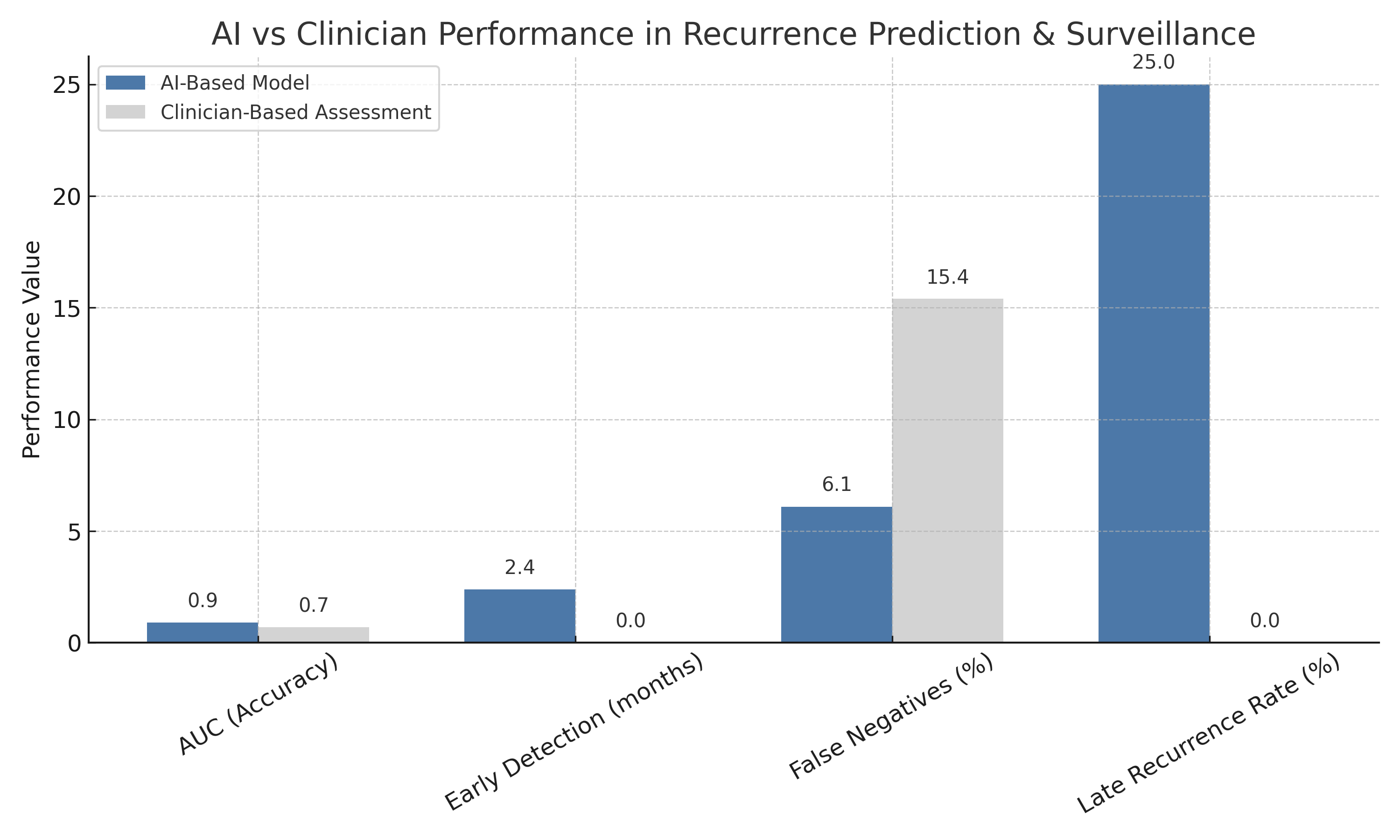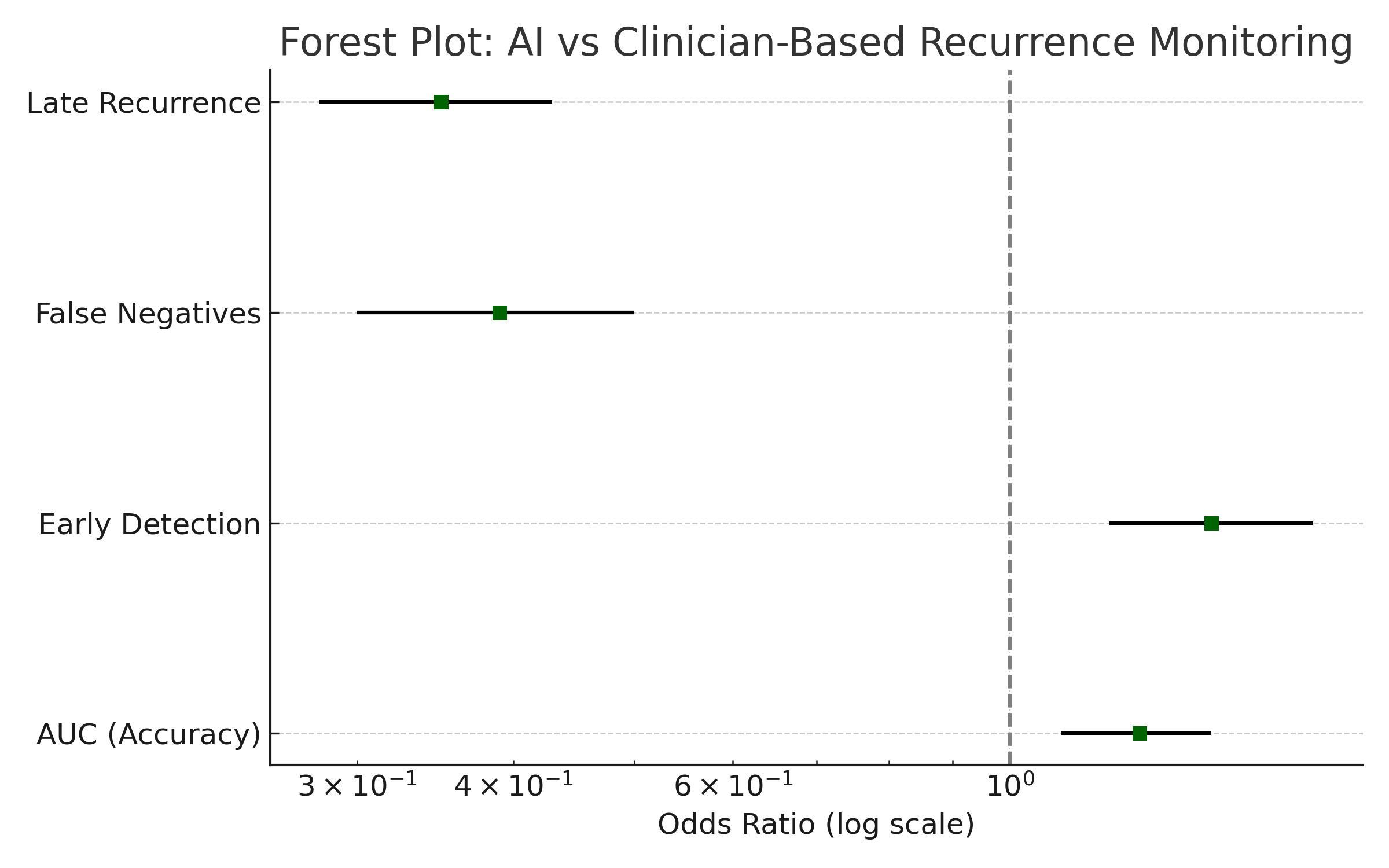Tuesday Poster Session
Category: Colorectal Cancer Prevention
P4751 - AI-Augmented Surveillance in Gastrointestinal Oncology: Enhancing Recurrence Prediction and Risk-Adaptive Monitoring
Tuesday, October 28, 2025
10:30 AM - 4:00 PM PDT
Location: Exhibit Hall

Prince Shah-Riar, MD (he/him/his)
DHR Health, Edinburg, Tx
Edinburg, TX
Presenting Author(s)
Prince Shah-Riar, MD1, Sadia Afrin Naurin, MBBS2, Tourna Nahrin NAHRIN. Khan, MBBS3, Munaiba Ahmad, MBBS4, Promy Saha, MBBS5, Asif Zamir, MD, FACG6
1DHR Health, Edinburg, Tx, McAllen, TX; 2Ibrahim Medical College, Tallahassee, FL; 3University of Illinois Urbana-Champaign, Champaign, IL; 4Chittagong Medical College, Dhaka, Dhaka, Bangladesh; 5Khulna Medical College and Hospital, Khulna, Khulna, Bangladesh; 6DHR Health Gastroenterology, Edinburg, TX
Introduction: GI cancers carry a high risk of recurrence post-treatment, yet conventional surveillance protocols are often non-adaptive and delay detection. This study evaluates the integration of artificial intelligence (AI) to enhance risk stratification and tailor follow-up regimens.
Methods: We performed a systematic comparative analysis of 23 studies (2015–2024) to compare AI models (neural networks, radiomics) with traditional clinician-based risk assessments for recurrence prediction. Outcomes included predictive accuracy (AUC), early detection (months), false-negative rates, and recurrence underdetection. Sub-analysis incorporated molecular biomarkers (MSI, KRAS) and staging data.
Results: AI models significantly outperformed clinician assessment in accuracy (AUC: 0.88 vs 0.69) and identified recurrence 2.4 months earlier on average. False-negative rates were reduced by more than 50% (6.1% vs 15.4%). AI-driven surveillance schedules were more intensive for high-risk patients and contributed to a 25% reduction in delayed recurrence detection. Biomarker integration further improved model specificity.
Discussion: AI-guided post-treatment surveillance for GI cancers enables dynamic, personalized monitoring that outperforms conventional methods. Integration into clinical workflows may improve early detection, optimize resource use, and enhance survival outcomes. These findings support the development of AI-guided clinical pathways for recurrence surveillance in GI oncology.

Figure: Figure 1:Performance Comparison of AI-Based Models vs Clinician Assessments in GI Cancer Recurrence Monitoring

Figure: Forest Plot of Odds Ratios Comparing AI-Enhanced vs Clinician-Based Surveillance for GI Cancer Recurrence Outcomes
Disclosures:
Prince Shah-Riar indicated no relevant financial relationships.
Sadia Afrin Naurin indicated no relevant financial relationships.
Tourna Nahrin Khan indicated no relevant financial relationships.
Munaiba Ahmad indicated no relevant financial relationships.
Promy Saha indicated no relevant financial relationships.
Asif Zamir indicated no relevant financial relationships.
Prince Shah-Riar, MD1, Sadia Afrin Naurin, MBBS2, Tourna Nahrin NAHRIN. Khan, MBBS3, Munaiba Ahmad, MBBS4, Promy Saha, MBBS5, Asif Zamir, MD, FACG6. P4751 - AI-Augmented Surveillance in Gastrointestinal Oncology: Enhancing Recurrence Prediction and Risk-Adaptive Monitoring, ACG 2025 Annual Scientific Meeting Abstracts. Phoenix, AZ: American College of Gastroenterology.
1DHR Health, Edinburg, Tx, McAllen, TX; 2Ibrahim Medical College, Tallahassee, FL; 3University of Illinois Urbana-Champaign, Champaign, IL; 4Chittagong Medical College, Dhaka, Dhaka, Bangladesh; 5Khulna Medical College and Hospital, Khulna, Khulna, Bangladesh; 6DHR Health Gastroenterology, Edinburg, TX
Introduction: GI cancers carry a high risk of recurrence post-treatment, yet conventional surveillance protocols are often non-adaptive and delay detection. This study evaluates the integration of artificial intelligence (AI) to enhance risk stratification and tailor follow-up regimens.
Methods: We performed a systematic comparative analysis of 23 studies (2015–2024) to compare AI models (neural networks, radiomics) with traditional clinician-based risk assessments for recurrence prediction. Outcomes included predictive accuracy (AUC), early detection (months), false-negative rates, and recurrence underdetection. Sub-analysis incorporated molecular biomarkers (MSI, KRAS) and staging data.
Results: AI models significantly outperformed clinician assessment in accuracy (AUC: 0.88 vs 0.69) and identified recurrence 2.4 months earlier on average. False-negative rates were reduced by more than 50% (6.1% vs 15.4%). AI-driven surveillance schedules were more intensive for high-risk patients and contributed to a 25% reduction in delayed recurrence detection. Biomarker integration further improved model specificity.
Discussion: AI-guided post-treatment surveillance for GI cancers enables dynamic, personalized monitoring that outperforms conventional methods. Integration into clinical workflows may improve early detection, optimize resource use, and enhance survival outcomes. These findings support the development of AI-guided clinical pathways for recurrence surveillance in GI oncology.

Figure: Figure 1:Performance Comparison of AI-Based Models vs Clinician Assessments in GI Cancer Recurrence Monitoring

Figure: Forest Plot of Odds Ratios Comparing AI-Enhanced vs Clinician-Based Surveillance for GI Cancer Recurrence Outcomes
Disclosures:
Prince Shah-Riar indicated no relevant financial relationships.
Sadia Afrin Naurin indicated no relevant financial relationships.
Tourna Nahrin Khan indicated no relevant financial relationships.
Munaiba Ahmad indicated no relevant financial relationships.
Promy Saha indicated no relevant financial relationships.
Asif Zamir indicated no relevant financial relationships.
Prince Shah-Riar, MD1, Sadia Afrin Naurin, MBBS2, Tourna Nahrin NAHRIN. Khan, MBBS3, Munaiba Ahmad, MBBS4, Promy Saha, MBBS5, Asif Zamir, MD, FACG6. P4751 - AI-Augmented Surveillance in Gastrointestinal Oncology: Enhancing Recurrence Prediction and Risk-Adaptive Monitoring, ACG 2025 Annual Scientific Meeting Abstracts. Phoenix, AZ: American College of Gastroenterology.
